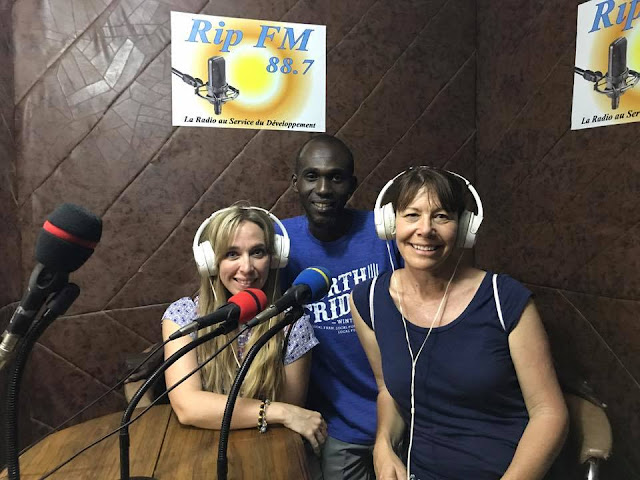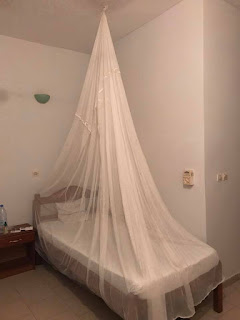There are many methods of transportation in Senegal. Having spent a few days in Dakar and also having experience life in Nioro, there are many differences between the urban and rural areas. There are paved roads and many cars in big cities like Dakar. People travel in cars, like we have in the US. In smaller areas, like Nioro du Rip, there aren't many paved roads, most are dirt roads. Some means of transportation are not as readily available.
I have noticed that there are some optional things when driving, such a lanes and stop signs. People don't really follow either. Stop signs seem to be optional, and people tend to decide whether or not to stop if there are other cars around or not. We did happen to see a traffic light in Dakar, and people were following those traffic rules. Not many roads have lanes painted to keep cars in their own lane. In fact, I don't think I have seen any lanes at all! People use their horns A LOT. That horn can mean many different things.
Beep beep - I'm changing lanes.
Beep beep - I'm here in this lane, stay on your side.
Beep beep - I'm going to pass you on the left.
Beep beep - Don't even think about coming into my lane.
Beep beep - Get out of the road, Donkey (or goat or sheep)
Beep beep - (to pedestrians) Be careful, I'm driving right beside you.
Beep beep - (to a motorbike) I'm here, and I see you.
Beep beep - MOVE!
Beep beep - Coming through, please be aware.
There are many things a honked horn can mean. It is basically meant for awareness, not to be rude at all. It is a lot safer that a car honks when it's around the corner to avoid hitting someone or someone hitting the car.
In bigger cities, you can have busses called "Car Rapide" like this:
You can also have taxis like this:
There are other busses called "Dakar Dem Dikk" that are like city buses - but we haven't seen any of those yet.
There is also a modern bus called "Car Tata" that is very much like a city bus.
In Nioro I have seen busses called "Car Ndiaga Ndiaye" where many people pile inside the bus or grab on bars outside the bus to travel to a different location. They are often crowded and pick up people along the side of the road at depots.
Some people, especially students, may get here and there by riding a bike.
There is even a form of transportation they call "Sept Place" - which means seven seats. However, locals call them "Sept Place, Sept Mort" - which means seven seats, seven dead. This mode of transportation is seen as very dangerous and not reliable at all.
Today is the market in Nioro. We have seen many people traveling by donkey or horse cart. The carts don't travel very fast, but it allows them to carry larger loads than walking or taking a bike or a motorbike.
Probably the most popular method of transport in Nioro (other than walking) is called a "Djakarta" or motorbike. Not only do people own them and use them personally, they are also for hire. We have seen parents picking their children up at school and taking them home on djakartas. One father was carrying three children on his. He had one child seated in front of him and two behind him. I have seen mothers carrying their babies strapped on their backs while also riding on a djakarta. Motorbikes are very popular and an efficient means of transportation. Not many people own cars in Nioro. Very few. The roads do not lend themselves to cars many times, and motorbikes can be just as efficient.






















































